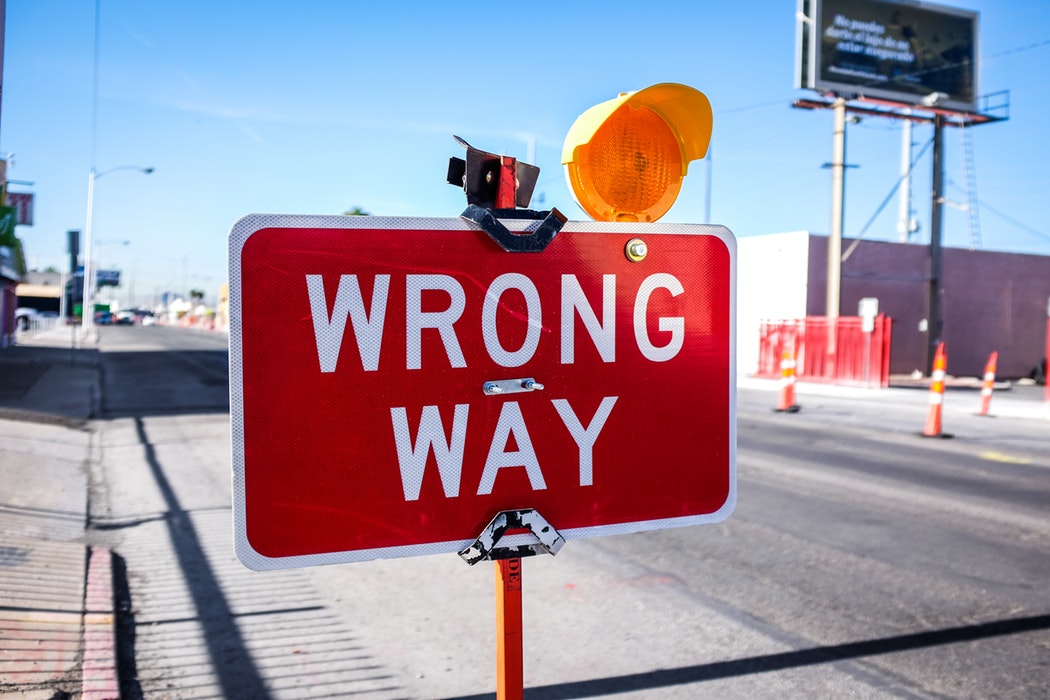5 Ways Ego Can Ruin Your Life

When we want to achieve something in life, we can become so wrapped up on success that we experience an inflation in our egos. There’s nothing wrong with going wholeheartedly after the bold visions or dreams you have. In fact, that’s what it means to grow: you’re supposed to take risks, mess up, and learn from your mistakes. Ryan Holiday, author of Ego is the Enemy, writes, “The problem is that when we get our identity tied up in our work, we worry that any kind of failure will then say something bad about us as a person. It’s a fear of taking responsibility, of admitting that we might have messed up. It’s the sunk cost fallacy. And so we throw good money and good life after bad and end up making everything so much worse.”
Sunk cost fallacy is when someone commits a certain behavior based on the time, money, or effort they’ve already invested in something. When you realize just how much work you’ve already done on something, it makes it hard for you to abandon it. It isn’t always necessarily healthy, though, because your stubborn will to keep running with the same vision can leave you short-sighted that influences you to be self-destructive when you don’t know how or when to stop and take a break. It’s important to note that this is different from giving up altogether.
You can still believe in something and work towards achieving it, but if the approach you’re taking is bound to lead you to failure, you have to learn how to let go every once in a while to start over again with a better strategy. Otherwise, your obsession for success will only consume you. This is how some of the most well-accomplished CEOs often hit rock bottom and it’s because they let their egos take over. We want to help you understand just how harmful an overdriven ego can be before it does irreparable damage. Psych2Go shares with you 5 ways ego can ruin your life:

1. You begin to fear rejection and failure, which can stop you from achieving your dreams and goals.
You’ve made a lot of progress in your life and when you share that exciting news with the people in your life, all you want to do is keep that shiny image up. You enjoy the praise you receive and the attention you’re getting. Things start feeling like they may be falling into place for you that it’s almost too good to be true. So when you make mistakes along the way that create setbacks, you grow fearful of rejection and failure. This doesn’t give you any room to practice the art of resilience. As a result, you may stop yourself from reaching your fullest potential when you’re afraid to adapt to new ways or situations.

2. You don’t listen to others to understand, but rather do it with the intent to get the last word in.
When people’s egos are inflated, it gives them the impression that they’re superior over others. But more often than not, ego wears a disguise that influences the individual to talk over others because they are suffering from an inferiority complex. When you allow your self-importance to be the main focus, it makes it hard for you to take in other people’s perspectives. As a result, your communication skills begin to worsen because you don’t listen to others in order to understand. Instead, you do it to get the last word in, because winning an argument boosts your sense of self. But, you don’t learn how to problem-solve nor reach a healthy compromise when you allow your ego to drive your reckless actions.

3. You stop learning and think you have all the answers.
Humility becomes a foreign word to you. When your ego gets the best of you, it leaves you little room to stop, learn, and reflect on your experiences. It’s similar to the stereotype that adults have all the answers and children don’t have any valuable insights to offer. In reality, adults can be just as lost as kids when they haven’t been exposed to certain information or life encounters. When you forget to take on the role of a student, you miss out on the fact that learning is a lifelong skill, not a temporary one you can discard like training wheels.

4. You stop trying to do the right thing. Instead, you only care about getting credit.
When you let your ego drive you, it leaves you constantly craving for attention. As a result, you may only care about the work you do so long as you can continue carrying the title you’ve earned or receive awards. This can lead you down the path towards an empty, unfulfilling life. When you become dependent on your work for recognition, your ego bruises easily. What happens when you’re not recognized for the work that you do? It may be meaningful work that makes a difference in the world, but are you going to stop doing it because you’re no longer getting attention for it? As a result, ego can blur the lines and make you forget about important principles, ethics, and values.

5. You begin to live your life with an imaginary audience that it prevents you from being true to yourself.
This can increase symptoms of anxiety and depression when you constantly feel like the world is watching you. This can make it incredibly hard for others to reach you because you feel obligated to put on your best performance. You experience what psychologist David Elkind states that most adolescents often go through, which is a phenomenon called “imaginary audience.” When a 13 year old feels embarrassed about missing one week of school, they may become fixated on what the school might be saying about them. But in reality, a lot of people may not have noticed they were gone for that time period or didn’t give much thought to it in general.
When you live your life with an imaginary audience, you become afraid of letting others in because you’re unsure of how they will react to your true self. This destroys your opportunity to build authentic relationships with others, because you don’t practice expressing vulnerability. You may think it’s a sign of weakness and believe that others won’t accept you when you show your flawed, human side. But it’s ironic, because people will begin to dislike you anyway when you let your ego take over. The walls you build between yourself and the world only drives you further apart from others.
It’s important to realize that the people who care deeply about you don’t want to passively sit with the rest of the crowd and be your audience. Instead, they want to actively participate in your life, whether that means being your family, friend, or lover. But when you stop letting them play those roles and make them your audience, you place them in a position of hurt. As a result, building a delusional sense of self can kill lifelong friendships and relationships if you’re not careful. The truth is that people aren’t nearly as interested in you as you think they are, and adapting that type of perspective can set you free.
How has ego affected your life? Are you personally experiencing an ego overload or do you know someone going through it that is affecting your relationship? Psych2Go would love to hear your thoughts! Please be sure to leave a comment down below!
If you enjoyed this article, you may also like 5 Ways Perfectionism Can Make You More Depressed and How to Cope With It and 5 Ways to Form Productive Habits That Will Help You Get Ahead in Life from Psych2Go.
References:
5 Signs Ego is Ruining Your Relationship. (2017). Power of Positivity. Retrieved December 20, 2017.
Handel, S. (2016, June 13). Destroy Your Ego Before It Destroys You (And How We Make Bad Situations Even Worse). The Emotion Machine. Retrieved December 20, 2017.
Holiday, R. (2016, June 14). How Ego Almost Destroyed Steve Jobs’ Career. Fortune. Retrieved December 20, 2017.
Sunk Cost Fallacy. (2017). Retrieved December 20, 2017, from behavioraleconomics.com



[…] on being superior because we’re afraid of letting our guards down. So, we hold onto our pride and ego instead of admitting our flaws in fear that our partner will judge us. But, this only causes us to […]
I really like this topic and I think that the substance of the article is really important for the start of a new year. Ego is a sneaky culprit and it can be at the root of a lot of the problems that people face at work, home, school, etc. I like how you gave exposure to underacknowledged effects of an out of control ego.
I just noticed a few grammatical errors that might distract from the powerful argument made in your piece. In the first line of the introduction, when it says ” we can become so wrapped up on success” it may be clearer stated as “we can become so wrapped up in success” or “wrapped up in the pursuit of success”. Also, in the second paragraph of the intro, ” running with the same vision can leave you short-sighted that influences you to be self-destructive” it looks like you may have missed the “and” between short-sighted and that. Finally, in the title of the 5th point, it may read better if you swap out the “that” for an “and”.
My favorite section of the piece was under your third point when you talk about how we attribute wisdom to adults and discount the insight that children have. That is such an important point and you said it very eloquently. Life certainly isn’t linear and youth doesn’t make a person ignorant of the lessons all around them. Thank you for touching on that!
What is your favorite method for keeping the ego in check (under control)?
Well done and Happy New Year!